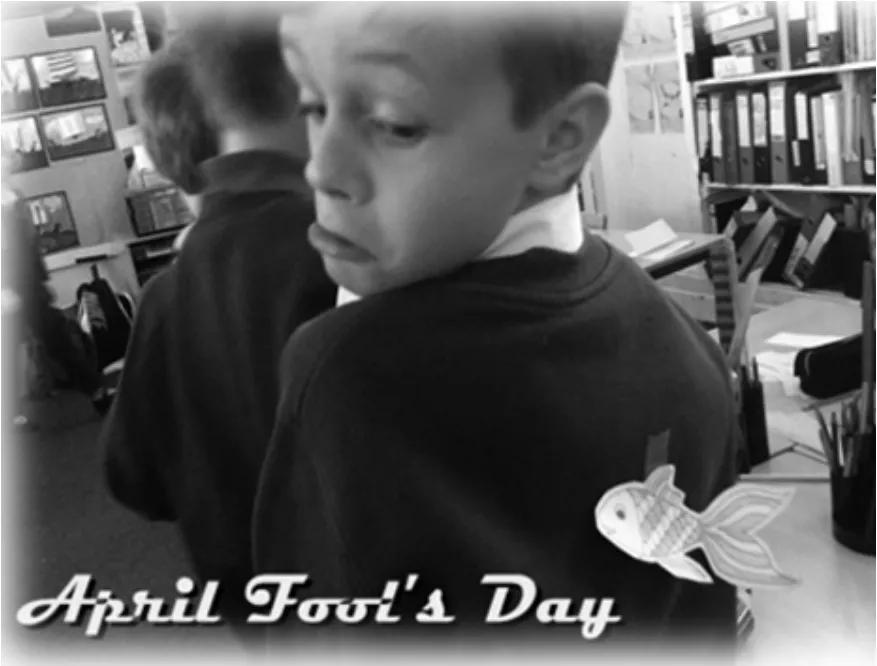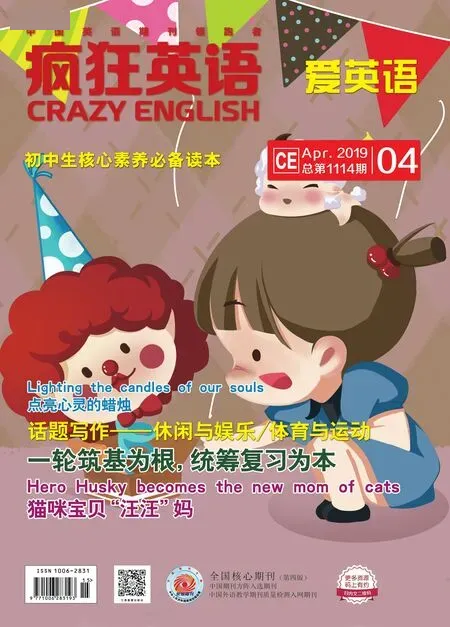愚人节
By Danilo/王丽婷(译)
◆语篇导读
愚人节全称为“四月愚人节”(又称“万愚节”),是西方一些国家的传统节日。在愚人节这一天,人们可以充分发挥自己的想象力,用任何方式互开玩笑,哄骗、愚弄他人,以换取乐趣。让我们更多地了解这个节日吧!
In sixteenth-century France,the celebration of the new year started on March 25 and lasted until April 1.It was celebrated in much the same way as it is today with parties and dancing into the late hours of the night.Thenin1564,KingCharlesⅨchanged the New Year's Day from March 25 to January 1.There were some people,however,who hadn't heard or didn't believethe change in the date,so they continued to celebrate New Year's Day on April 1.Others playedtrickson them and called them“April fools”.

In France today,April 1 is called“Poissond'Avril” (“April Fish”).French children fool their friends bytapinga paper fish to their friends'backs.When the young fool discovers this trick,theprankster yells, “Poisson d'Avril!”
Today Americans play small tricks on friends and strangers alike on the first of April.Onecommontrick on April Fool's Day,or called All Fools'Day,is pointing down to a friend's shoes and saying,“Yourshoelacesare untied.”School children might tell a classmate that school has been canceled.Whatever the trick is,if theinnocent victimfalls for the joke the prankster yells,“AprilFool!”
Most April Fool jokes are in good fun and not meant to harm anyone.The most clever April Fool joke is the one that makes everyone laugh,especially the person uponwhom the joke is played.American humorist,Mark Twain has said that the first of April is the day when we remember what we are the other 364 days of the year.
◆词语积淀
trick/trɪk/n.诡计;花招
tape/teɪp/v.用胶带粘住
prankster/'prækstə(r)/n.恶作剧的人
yell/jel/v.叫喊;大喊
common/'kɒmən/adj.常见的
shoelace/'ʃuːleɪs/n.鞋带
innocent/'ɪnəsnt/adj.无辜的
victim/'vɪktɪm/n.受骗者
◆典句赏析
1.There were some people,however,who hadn't heard or didn't believe the change in the date,so they continued to celebrate New Year's Day on April 1.但是,有些人没听说或者听说了但不相信新年改时间了,所以他们还是在4月1号这天进行庆祝。
so作并列连词,意为“所以;因此”,用来连接两个并列句,表示因果关系。who hadn't heard or didn't believe the change in the date是由关系代词who引导的非限制性定语从句,修饰先行词some people;the change in...是常见的词组,意为“在……方面改变”,后接名词或者代词。
【即时尝试】这里的空气受到了污染,所以庄稼快死了。
2.Others played tricks on them and called them“April fools”.其他人就拿他们开玩笑,把他们叫作“愚人”。
这是一个简单句。连词and连接的是由主语others涉及的两个并列谓语。play tricks on是固定短语,意为“骗……;捉弄……”,后面常接名词或者代词的宾格形式作宾语。
【即时尝试】他总是喜欢捉弄他的朋友。
3.American humorist,Mark Twain has said that the first of April is the day when we remember what we are the other 364 days of the year.正如美国幽默作家马克·吐温所说,只有在四月的第一天,我们才会记起在过去一年的364天中我们是多么愚蠢。
这是一个多重复合句。that the first of April is the day when we remember what we are...year是由连词that引导的宾语从句;when we remember what we are the other 364 days of the year是由关系副词when引导的定语从句,修饰先行词the day;what引导的从句,作动词remember的宾语。
【即时尝试】那是他永远不会忘记的时刻。
译文助读
16世纪的时候,法国人是在4月1号庆祝新年。他们那时候过新年的方法和我们现在几乎一样,人们会聚餐、跳舞直到深夜。到了1564年,法国国王查理九世颁布使用新历,将新年改到了1月1号这一天。但是,有些人没听说或者听说了但不相信新年改时间了,所以他们还是在4月1号这天进行庆祝。其他人就拿他们开玩笑,把他们叫作“愚人”。
如今,法国人把愚人节叫作“上钩的鱼”。法国孩子会在朋友的背上贴一张纸鱼,以此来戏弄别人。当那个年轻的小丑发现以后,开玩笑的人就会大叫:“上钩的鱼儿!”
当今的美国人,每逢愚人节,不管双方是否相识,都会开些小玩笑。在愚人节,或叫万愚节的这天,比较常见的把戏是指着朋友的鞋子说:“你鞋带没系。”学生可能会骗同学说学校放假了。不管是什么样的招数,只要那个无辜的受害者中计了,搞恶作剧的人就会尖叫:“愚人!”
愚人节所开的玩笑基本都是逗人的,没什么恶意。最高明的愚人节玩笑能让在场的每个人都捧腹大笑,即使是那个被捉弄的人也会忍俊不禁。正如美国幽默作家马克·吐温所说,只有在四月的第一天,我们才会记起在过去一年的364天中我们是多么愚蠢。

